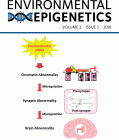
Epigenomics
Scope & Guideline
Pioneering Research at the Intersection of Genetics and Cancer.
Introduction
Aims and Scopes
- Epigenetic Mechanisms in Disease:
The journal highlights research on how epigenetic modifications, such as DNA methylation and histone modification, contribute to the development and progression of diseases, particularly cancers and neurodegenerative disorders. - Environmental and Lifestyle Influences:
There is a strong emphasis on studies that investigate how environmental factors, lifestyle choices, and nutrition impact epigenetic changes and their subsequent effects on health outcomes. - Precision Medicine and Biomarkers:
The journal supports the development of epigenetic biomarkers for early diagnosis, prognosis, and treatment responses in various diseases, promoting the integration of epigenomics into precision medicine. - Non-coding RNAs and Epitranscriptomics:
Research on non-coding RNAs, including lncRNAs and miRNAs, is a core area, focusing on their roles in gene regulation and their potential as therapeutic targets. - Methodological Advances in Epigenomics:
The journal publishes articles on novel technologies and methodologies in epigenomics research, including high-throughput sequencing, bioinformatics approaches, and experimental models.
Trending and Emerging
- Integration of Multi-Omics Approaches:
There is a growing trend towards integrating epigenomics with genomics, transcriptomics, and proteomics to provide a more comprehensive understanding of biological processes and disease mechanisms. - Impact of Gut Microbiota on Epigenetics:
Research exploring the relationship between gut microbiota and epigenetic changes is emerging as a significant theme, linking microbiome studies with health and disease outcomes. - Epigenetics in Aging and Longevity:
Studies focusing on the role of epigenetics in aging processes and longevity are increasingly prevalent, highlighting how epigenetic modifications can influence lifespan and age-related diseases. - Epigenetic Therapy and Drug Development:
There is a notable increase in research aimed at developing epigenetic therapies, including small molecule inhibitors and gene editing technologies, as potential treatment options for various diseases. - Social and Environmental Epigenomics:
Emerging themes explore how social determinants and environmental exposures influence epigenetic modifications, emphasizing the role of epigenomics in public health and health disparities.
Declining or Waning
- Basic Mechanistic Studies:
There appears to be a waning interest in purely mechanistic studies that do not directly connect to clinical implications or applications, as the journal increasingly favors translational research. - Single-Factor Analysis:
Research focusing solely on single epigenetic modifications without considering the broader epigenomic landscape or interactions with other biological factors has seen a decrease in publication. - Animal Model Studies:
The use of traditional animal models for studying epigenetics, particularly when not linked to human health outcomes, is becoming less common, with a shift towards human studies and clinical relevance. - Historical Perspectives on Epigenetics:
Articles that focus on historical perspectives or reviews of epigenetics without new insights or data are less frequently accepted, as the journal prioritizes innovative and cutting-edge research.
Similar Journals

Human Gene
Exploring the Genetic Basis of LifeHuman Gene is an innovative open access journal published by ELSEVIER, dedicated to the ever-evolving field of genetics. Established in 2022, this journal serves as a vital resource for researchers, professionals, and students alike, aiming to facilitate the dissemination of groundbreaking research and advancements in both basic and clinical genetics. With an ISSN of 2773-0441, Human Gene focuses on providing a platform for high-quality studies that investigate genetic mechanisms, their implications in health and disease, and novel therapeutic strategies. The journal currently holds a Q4 ranking in both Genetics and Clinical Genetics categories, reflecting its emerging status within the scientific community, and strives to enhance its impact to better serve an engaged audience. With its base in Amsterdam, Netherlands, Human Gene is committed to making research accessible through its open access model, inviting contributions that advance our understanding of human genetics and foster collaboration across disciplines.

GENE
Fostering Academic Excellence in Genetics and MedicineGENE, an esteemed journal published by Elsevier, serves as a vital resource for researchers and professionals in the fields of genetics and medicine. With an ISSN of 0378-1119 and an E-ISSN of 1879-0038, this scholarly journal has been at the forefront of genetic research since its inception in 1976 and is set to continue until 2025. Situated in the Netherlands, GENE is recognized for its significant contributions, reflected in its Q2 ranking in both Genetics and Miscellaneous Medicine categories for 2023. This positioning within the Scopus rankings demonstrates its impact and relevance in a competitive field, where it holds the rank of #129 out of 347 in Genetics, placing it within the 62nd percentile. Although it does not offer open access options, GENE provides invaluable insight into contemporary genetic research, thereby fostering academic discussions and advancements. Researchers, professionals, and students alike will find GENE an essential platform for disseminating knowledge and exploring innovative developments in genetics and associated sciences.

BIOGERONTOLOGY
Illuminating the Path to Healthy AgingBIOGERONTOLOGY, published by SPRINGER, is a premier journal dedicated to the interdisciplinary study of biological aging processes and their implications for health and longevity. With an ISSN of 1389-5729 and an E-ISSN of 1573-6768, this journal features cutting-edge research that addresses critical questions in the fields of aging, geriatrics, and gerontology. Ranking impressively in the top quartiles, particularly as Q1 in Gerontology, BIOGERONTOLOGY is recognized for its contributions to advancing the understanding of aging at both molecular and systemic levels. The journal’s rich repository of scholarly articles provides valuable insights for researchers, healthcare professionals, and students alike, fostering a deeper comprehension of age-related biological mechanisms. Although not an open-access journal, it is highly regarded with an impact factor that reflects its significant role in the academic community. The journal spans from 2000 to 2024, ensuring a broad historical context for its studies, and is based in the Netherlands, with its administrative office located at One New York Plaza, Suite 4600, New York, NY 10004, United States. Engaging with BIOGERONTOLOGY means joining a global dialogue on the science of aging and the implications it holds for humanity.

MUTATION RESEARCH-REVIEWS IN MUTATION RESEARCH
Connecting Researchers to the Latest in Mutation StudiesMUTATION RESEARCH-REVIEWS IN MUTATION RESEARCH, published by Elsevier, stands as a premier journal in the fields of Genetics and Health, Toxicology and Mutagenesis, boasting a Q1 ranking in both categories for 2023. With an impressive impact factor and rigorous peer-review process, this journal serves as a vital platform for disseminating cutting-edge research and comprehensive reviews regarding the implications of genetic mutations and related health effects. Established in the Netherlands, it has evolved from its inception in the early 1990s to become an essential resource for researchers, professionals, and students alike, facilitating advancements in the understanding of mutation research. Despite not offering an open-access model, the journal ensures a wide reach through institutional subscriptions, emphasizing its commitment to fostering scholarly dialogue and promoting significant findings within the scientific community.

Environmental Epigenetics
Empowering Research on Epigenetics and Environmental HealthEnvironmental Epigenetics, published by Oxford University Press, is a leading open access journal dedicated to advancing the understanding of the epigenetic mechanisms that underpin environmental influences on health and disease. With an ISSN of 2058-5888 and established as an open access platform since 2015, this journal serves as a vital resource for researchers in the fields of genetics, environmental science, and health, offering insights from multidisciplinary perspectives. The journal has gained notable recognition in the academic community, reflected by its impressive Scopus rankings and its classification in the second quartile (Q2) for Genetics and other related disciplines as of 2023. It aims to foster innovative research that bridges laboratory findings and real-world environmental issues, making it an indispensable tool for professionals and students pursuing knowledge at the intersection of genetics, environmental science, and public health. With its commitment to disseminating valuable research findings freely, Environmental Epigenetics stands out as an essential publication for those aiming to understand the significant impacts of environmental factors on genetic expression.

JOURNAL OF MOLECULAR MEDICINE-JMM
Unveiling the Molecular Mysteries of Health and Disease.JOURNAL OF MOLECULAR MEDICINE (JMM) is a premier publication dedicated to advancing the field of molecular medicine, encompassing critical areas such as drug discovery, genetics, and biochemistry. Published by Springer Heidelberg in Germany, this influential journal has established its significance within the academic community, achieving an impressive Q1 ranking across multiple categories as of 2023, including Drug Discovery, Clinical Genetics, and Molecular Medicine. With a focus on publishing high-quality research and novel insights, JMM appeals to a diverse audience of researchers, professionals, and students passionate about the molecular underpinnings of health and disease. The journal, which has seen a convergence of relevant research spanning from 1976 to 2024, is instrumental in showcasing groundbreaking studies that push the boundaries of knowledge in molecular therapeutics and biomedical science. While it does not offer open access, the rigor of its peer-reviewed content ensures that each publication is a valuable addition to the scientific discourse surrounding molecular medicine. For comprehensive studies and reviews that highlight the intersection of molecular biology and clinical application, look no further than JOURNAL OF MOLECULAR MEDICINE.

Non-Coding RNA
Pioneering Discoveries in Non-Coding RNA BiologyNon-Coding RNA is a prestigious open-access journal published by MDPI, based in Switzerland, dedicated to the significant and rapidly evolving field of non-coding RNA research. Established in 2015, this journal has quickly become an essential resource for researchers and professionals, showcasing innovative studies and breakthroughs related to the functions and mechanisms of non-coding RNAs in various biological processes. With an impressive Q1 ranking in Biochemistry and strong rankings in Genetics and Molecular Biology, Non-Coding RNA consistently reflects the highest standards of academic publishing. The journal provides comprehensive access options, granting researchers worldwide the ability to disseminate and access high-quality research without subscription barriers. As the landscape of genomics and molecular discoveries continues to expand, the journal aims to foster interdisciplinary exchanges and collaborations, making it a vital platform for advancing knowledge and innovation in this critical area of biological science.

BIOCHEMICAL GENETICS
Unraveling the Complexities of Life at the Molecular LevelBIOCHEMICAL GENETICS, published by Springer/Plenum Publishers, is a prominent journal in the fields of biochemistry, genetics, and molecular biology, with a substantial impact on the scientific community since its inception in 1967. The journal holds a significant position within various academic quartiles, ranking Q2 in Ecology, Evolution, Behavior and Systematics, and Q3 in Biochemistry, Genetics, and Medicine (miscellaneous), among others, demonstrating its diverse and interdisciplinary reach. With an ISSN of 0006-2928 and an E-ISSN of 1573-4927, it is recognized for contributing critical research insights and methodologies that drive the fields of biochemical genetics forward. Although it is not an Open Access journal, it provides vital access options and resources for researchers globally, facilitating the dissemination of knowledge across institutions. Positioned within the competitive landscape of Scopus rankings, it maintains respectable standings across its focused areas, making it an invaluable resource for researchers, professionals, and students seeking to deepen their understanding of genetic mechanisms and biochemical processes.

CRITICAL REVIEWS IN EUKARYOTIC GENE EXPRESSION
Advancing the Frontiers of Gene Expression KnowledgeCRITICAL REVIEWS IN EUKARYOTIC GENE EXPRESSION, published by BEGELL HOUSE INC, serves as a vital resource within the fields of Genetics and Molecular Biology. With the ISSN 1045-4403 and E-ISSN 2162-6502, this journal has been contributing to scientific discourse since 1990 and is projected to continue its publication until 2024. Despite its classification in the Q3 quartile for both Genetics and Molecular Biology, its impact on the research community is significant, as evidenced by its diverse range of critical reviews that synthesize and analyze emerging trends and foundational studies in gene expression. The journal, located in the United States at 50 North St, Danbury, CT 06810, offers a platform for researchers, professionals, and students to engage with innovative ideas and methodologies that drive forward the understanding of gene regulatory mechanisms in eukaryotes. Although it currently does not offer open access, the journal's content remains crucial for those dedicated to advancing knowledge in the intricacies of genetic expression.

NAR Cancer
Innovating diagnostics and treatments for tomorrow's healthcare.NAR Cancer, published by Oxford University Press, is a pioneering open access journal established to advance the rapidly evolving field of cancer research. Since its inception in 2019, this journal has gained substantial recognition, achieving a prestigious Q1 ranking in both Cancer Research and Oncology categories as of 2023. With a focused objective to disseminate high-quality research, reviews, and insights into innovative cancer treatments and diagnostics, NAR Cancer serves as an essential platform for researchers, healthcare professionals, and students alike. The journal is accessible for all since it became open access in 2020, ensuring a global reach and impact. Positioned in the competitive landscape of oncology, with impressive Scopus rankings, it offers a unique opportunity for contributors to share their work with an engaged and interdisciplinary audience. With a commitment to excellence, NAR Cancer is dedicated to driving forward the understanding and management of cancer worldwide.